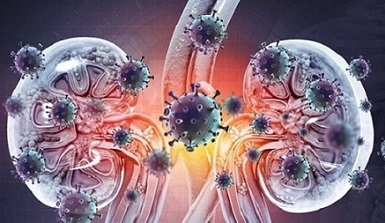COVID-19 News: Study Finds That Non-Omicron Variants More Likely To Cause Damage To The Kidney's Filtration System Than Omicron Sublineages!
COVID-19 News - Proteinuria Mar 24, 2023 2 years, 8 months, 2 weeks, 6 days, 22 hours, 1 minute ago
COVID-19 News: A new study led by researchers from Rush University Medical Center, Chicago-USA has found that non-Omicron variants more likely to cause damage to the kidney's filtration system than Omicron sub-lineages.

The study team also comprised of scientists from Tulane National Primate Research Center-USA, University Medicine Greifswald-Germany, NIPOKA GmbH-Germany, Morphic Therapeutic-USA and University of Michigan-USA.
In individuals with moderate to severe COVID-19 disease, both proteinuria and high plasma levels of soluble urokinase receptor (suPAR) are commonly observed.
The study team found a new type of proteinuria originating as part of a viral response. Inoculation of severe acute respiratory syndrome coronavirus 2 (SARS-CoV-2) caused increased suPAR levels and glomerulopathy in African Green Monkeys.
The study team developed a unique mouse model whereby inhaled variants of the SARS-CoV-2 spike S1 protein elicited proteinuria with high levels of suPAR.
This proteinuric response was prevented by either suPAR blockade or prior SARS-CoV-2 vaccination.
The study team demonstrated biophysical and functional differences of spike S1 protein between various SARS-CoV-2 variants and their binding to regulatory podocyte integrins.
Interestingly, in a cohort of 1991 COVID-19 patients, suPAR levels exhibited a stepwise association with proteinuria in non-Omicron, but not in Omicron infections.
These study findings suggest that viral proteins may cause proteinuria by elevating plasma suPAR levels and co-activating podocyte integrins, thus providing a basis for understanding viral-associated proteinuria syndromes.
The study findings were published on a preprint server and are currently being peer reviewed for publication into the journal: Nature Portfolio.
https://www.researchsquare.com/article/rs-2659085/v1
COVID-19, caused by the SARS-CoV-2 virus, can lead to a variety of health complications, including kidney issues. In particular, moderate to severe COVID-19 cases often exhibit proteinuria, or high levels of protein in the urine, and high plasma levels of soluble urokinase receptor (suPAR).
Past
COVID-19 News coverages showed that suPAR levels could even be a biomarker for those at risk of disease severity and also for acute kidney injury (AKI) following SARS-CoV-2 infections.
https://www.thailandmedical.news/news/latest-covid-19-news-protein-supar-identified-as-new-biomarker-for-acute-respiratory-failure-in-covid-19-patients
https://www.thailandmedical.news/news/covid-19-diagn
ostics-researchers-uncover-new-protein-biomarker-supar-to-identify-covid-19-patients-at-risk-of-acute-kidney-injury-aki
The study explored the relationship between viral proteins, suPAR, and kidney filtration barrier dysfunction, which could help us better understand and treat virus-associated proteinuria syndromes.
The study examined the effects of SARS-CoV-2 on kidney function in African Green Monkeys and mice.
The study team found that the virus caused increased suPAR levels and glomerulopathy, or damage to the kidney's filtration system, in the monkeys.
In the mice, exposure to the SARS-CoV-2 spike S1 protein triggered proteinuria and high suPAR levels, which could be prevented by suPAR blockade or vaccination against the virus.
Importantly, the study team also explored the differences between various SARS-CoV-2 variants and their impact on podocyte integrins, cells that help maintain the kidney's filtration barrier.
In a group of 1,991 COVID-19 patients, suPAR levels were associated with proteinuria in non-Omicron infections, but not in Omicron infections. These findings suggest that viral proteins may contribute to proteinuria by increasing suPAR levels and activating podocyte integrins.
Additional Insights
The study provides experimental and clinical evidence that supports a unique interaction between viral proteins, suPAR, and αvβ3 integrin, which leads to glomerular barrier dysfunction and proteinuria. This interaction varies depending on the specific viral strain involved. The findings also have broader implications for understanding the role of viral proteins and immune mediators in virus-associated proteinuric diseases.
Viral infections, such as HIV-1 and Puumala hantavirus (PUUV), can also cause rapid proteinuria in mice with elevated suPAR levels. This suggests that viral infections and increased suPAR levels might work together to cause proteinuria.
The discovery of a viral-induced proteinuria mechanism could lead to new treatment options, such as antiviral medications or therapies that block the suPAR-integrin cascade.
The study also raises questions about the role of direct viral infection in kidney dysfunction. While SARS-CoV-2 infection of kidney cells has been debated, the presence of viral proteins in the bloodstream or local cellular environment could cause harm to host cells without direct infection. The researchers found that the 2019-nCov spike S1 protein activates αvβ3 integrin on podocytes, which, in combination with high suPAR levels, leads to reduced expression of nephrin and podocin, two proteins crucial for maintaining the kidney's filtration barrier.
Conclusion
The study findings provide insight into the distinct effects of different SARS-CoV-2 variants on kidney function in both COVID-19 patients and experimental models. By understanding the interactions between viral proteins, suPAR, and kidney cells, we may be able to develop new treatments for proteinuria and related kidney conditions. This research also offers a framework for understanding the molecular interactions between viral infections and the immune system, which could explain infection-associated proteinuric responses and the progression of glomerular diseases.
For the latest
COVID-19 News, keep on logging to Thailand Medical News.
